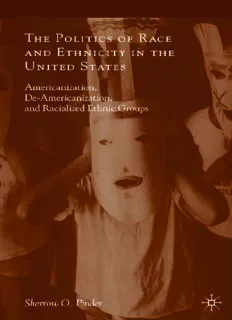
The Politics of Race and Ethnicity in the United States: Americanization, De-Americanization, and Racialized Ethnic Groups PDF
Preview The Politics of Race and Ethnicity in the United States: Americanization, De-Americanization, and Racialized Ethnic Groups
The Politics of Race and Ethnicity in the United States ppaall--ppiinnddeerr--0000ffmm..iinndddd ii 33//44//1100 33::0000::0099 PPMM This page intentionally left blank The Politics of Race and Ethnicity in the United States Americanization, De-Americanization, and Racialized Ethnic Groups Sherrow O. Pinder ppaall--ppiinnddeerr--0000ffmm..iinndddd iiiiii 33//44//1100 33::0000::1100 PPMM the politics of race and ethnicity in the united states Copyright © Sherrow O. Pinder, 2010. All rights reserved. First published in 2010 by PALGRAVE MACMILLAN® in the United States—a division of St. Martin’s Press LLC, 175 Fifth Avenue, New York, NY 10010. Where this book is distributed in the UK, Europe, and the rest of the world, this is by Palgrave Macmillan, a division of Macmillan Publishers Limited, registered in England, company number 785998, of Houndmills, Basingstoke, Hampshire RG21 6XS. Palgrave Macmillan is the global academic imprint of the above companies and has companies and representatives throughout the world. Palgrave® and Macmillan® are registered trademarks in the United States, the United Kingdom, Europe and other countries. ISBN: 978-0-230-61356-0 Library of Congress Cataloging-in-Publication Data Pinder, Sherrow O. The politics of race and ethnicity in the United States : Americanization, de-Americanization, and racialized ethnic groups / Sherrow O. Pinder. p. cm. Includes bibliographical references. ISBN 978-0-230-61356-0 (alk. paper) 1. Ethnicity—United States. 2. Ethnic groups—United States. 3. Whites—Race identity—United States. 4. Multiculturalism—United States. 5. United States—Ethnic relations. I. Title. GN560.U6P56 2010 305.800973—dc22 2009035111 A catalogue record of the book is available from the British Library. Design by Scribe Inc. First edition: April 2010 10 9 8 7 6 5 4 3 2 1 Printed in the United States of America. ppaall--ppiinnddeerr--0000ffmm..iinndddd iivv 33//44//1100 33::0000::1100 PPMM For Amber Chambers And Anthony and Alyssa Greaves With Love ppaall--ppiinnddeerr--0000ffmm..iinndddd vv 33//44//1100 33::0000::1100 PPMM This page intentionally left blank Contents Acknowledgments ix Introduction: The Brevity of the Argument 1 1 Conceptual Framework 13 2 Whiteness: The Definitive Conceptualization of an American Identity 39 3 The Specter of Whiteness 67 4 The Quandary of Multiculturalism in America 95 5 Postmulticulturalism 123 Conclusion: Reflections 151 Notes 163 References 211 Index 237 ppaall--ppiinnddeerr--0000ffmm..iinndddd vviiii 33//44//1100 33::0000::1100 PPMM This page intentionally left blank Acknowledgments The idea for this book grew out of a class that I teach on race and ethnicity at California State University, Chico. Based on this, I submitted a proposal on race and ethnicity at the Midwest Political Science Association annual meeting and presented the paper there in April 2007. After a meeting with Anthony Wahl, who was then a senior editor with Palgrave Macmillan, about expanding my paper into a book, I started to think seriously about America’s cultural identity and the question of where and how racialized ethnic groups fit into such an identity. In this respect, I would like to sin- cerely thank Anthony Wahl for supporting my book project. At California State University, Chico, I was given a course release to work on my book, for which I was very appreciative to have received. While I had initially started to think about what I would write in my book during this time, it was not until my time spent during the summer of 2008 at the W. E. B. Du Bois Institute for African and African American Research, at Harvard University, that I truly started to focus on and solidify my ideas for this book. I learned a great deal about blacks’ endless struggles in the United States for racial equality. In this respect, I would like to thank my colleague, Robert Stanley in the Department of Political Science at Califor- nia State University, Chico, for his support. Also, I would like to thank the National Endowment for the Humanities for their financial support. I also benefited enormously from my participa- tion in the Multiculturalism and Beyond Conference at Bielefeld Univer- sity, Germany, in 2009 and the Re-orienting Whiteness Conference at the University of Melbourne, Australia, in 2008. Thanks to my colleagues at the conferences for all their feedback on my papers. I would particularly like to thank Demetrius L. Eudell in the Department of History and the Center for African American Studies, Wesleyan University; Juergen Hein- ricks, Department of Art History, Seton Hall University; and Mariangela Orabona, University of Naples, Naples Italy. I am especially grateful to my friend and colleague, Cynthia Bynoe, for reading and commenting on the book proposal and the first draft of the book. I particularly wish to thank my dear friend Nadia Louar, who teaches in the French and Francophone Department at the University of Wisconsin, ppaall--ppiinnddeerr--0000ffmm..iinndddd iixx 33//44//1100 33::0000::1100 PPMM
Description: